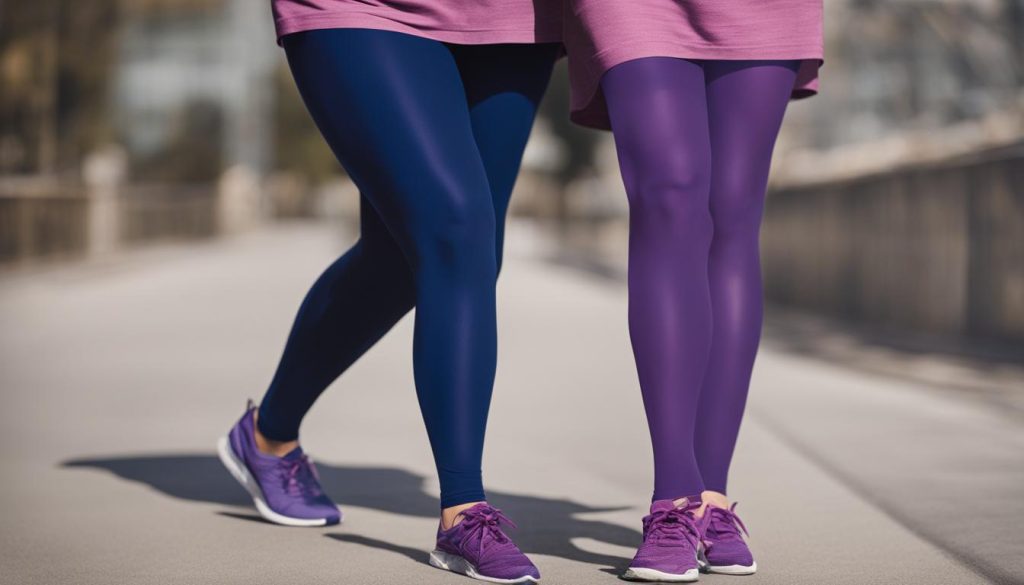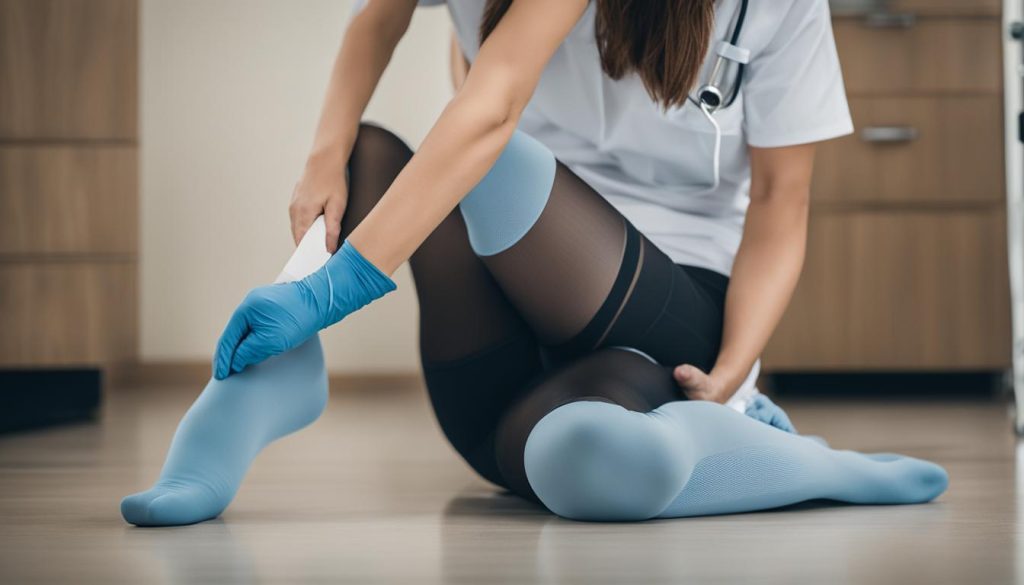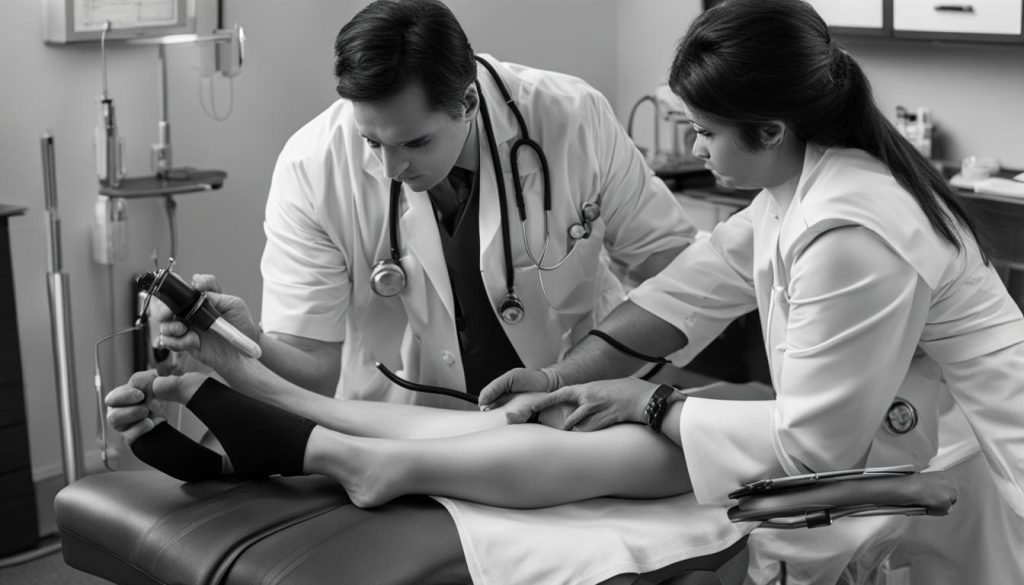 I’m here to share with you a holistic and effective approach to treating swollen legs. If you’re tired of dealing with discomfort and the limitations that leg swelling brings, you’ve come to the right place. In this article, I will introduce you to natural remedies and home treatments that can provide relief and improve your overall well-being.
I’m here to share with you a holistic and effective approach to treating swollen legs. If you’re tired of dealing with discomfort and the limitations that leg swelling brings, you’ve come to the right place. In this article, I will introduce you to natural remedies and home treatments that can provide relief and improve your overall well-being.
Swollen legs, also known as edema, can be caused by a variety of factors. From lifestyle choices to certain medical conditions, understanding the underlying causes is key to finding the right treatment. By adopting a natural approach, we can address the root causes of swollen legs and reduce swelling without resorting to harsh medications or invasive procedures.
Key Takeaways:
- Natural remedies can effectively reduce leg swelling without harsh medications or invasive procedures.
- Understanding the underlying causes of swollen legs is crucial for effective treatment.
- Home remedies such as massage, Epsom salt baths, and Ayurvedic treatments can alleviate swelling and improve circulation.
- Other solutions like elevating the legs, wearing compression socks, and maintaining foot hygiene can provide quick relief.
- Seek medical help when necessary, especially in cases where home remedies do not provide relief or there are accompanying symptoms.
Common Causes of Swollen Legs
Swelling in the legs can be a result of various factors. Understanding the causes of swollen legs is essential in determining the appropriate treatment. Some common causes include:
- Prolonged standing: Standing for extended periods can lead to fluid accumulation in the legs.
- Hot weather: Heat can cause blood vessels to expand, leading to swelling in the legs.
- Burn injuries: Burns can cause inflammation and fluid retention in the affected area.
- Pregnancy: Hormonal changes and increased pressure on the veins during pregnancy can result in leg swelling.
- Medication side effects: Certain medications can cause fluid retention as a side effect.
- Deficiency of protein or vitamin B1: Inadequate intake of these nutrients can contribute to leg swelling.
- Allergic reactions: Allergies can cause inflammation and fluid buildup in the legs.
- Certain diseases: Conditions such as congestive heart failure and venous insufficiency can lead to swelling in the legs.
| Causes of Swollen Legs | Prevalence |
|---|---|
| Prolonged standing | Common |
| Hot weather | Common |
| Burn injuries | Rare |
| Pregnancy | Common |
| Medication side effects | Common |
| Deficiency of protein or vitamin B1 | Rare |
| Allergic reactions | Common |
| Certain diseases | Common |
Identifying the underlying cause of swollen legs is crucial in developing an effective treatment plan. It is recommended to consult with a healthcare professional for a proper diagnosis and personalized treatment.
Symptoms of Swollen Legs
Recognizing the symptoms of swollen legs is crucial in identifying and addressing the underlying causes. Common signs of leg swelling include:
- Swelling in the ankles and feet
- Shiny or stretched appearance of the skin
- Pain and stiffness in the affected areas
- Difficulty in walking or moving the legs
- Rapid weight gain
- Pitting or non-pitting edema (when pressing on the swollen area leaves a temporary indentation or doesn’t)
- Redness or warmth in the swollen area
These symptoms may vary in severity and can be experienced alongside other discomforts. Early recognition and intervention can help prevent complications and improve overall well-being.
Swollen legs can be a result of various factors and conditions, and paying attention to the symptoms is the first step toward finding relief and appropriate treatment.
If you experience any of these symptoms, it is important to consult a healthcare professional for a proper diagnosis and guidance. They can assess your specific situation and recommend the best course of action to address the underlying causes of your swollen legs. Remember that everyone’s experience with leg swelling may differ, and individualized care is key to effective management.

A visual representation of the symptoms of swollen legs.
Home Remedies for Swollen Legs
When it comes to reducing leg swelling naturally, there are several effective home remedies that can provide relief. These remedies are easy to incorporate into your daily routine and can help alleviate discomfort. Here are some options to consider:
- Massage: Gently massaging the swollen leg can improve circulation and reduce fluid build-up. Use gentle strokes and upward movements to promote lymphatic drainage.
- Epsom Salt Baths: Soaking your legs in warm water with Epsom salt can help reduce swelling. The magnesium in Epsom salt aids in relaxation and can alleviate pain and discomfort.
- Ayurvedic Pastes: Applying Ayurvedic pastes made from natural ingredients like turmeric and ginger can have anti-inflammatory properties and help reduce swelling.
- Abhyanga Treatment: This Ayurvedic self-massage technique involves using warm oil to massage the entire body, including the legs. It can help improve circulation and reduce fluid retention.
Additionally, incorporating essential oils like lavender or chamomile into your massage routine can provide added relief. These oils have soothing properties that can promote relaxation and reduce swelling.
It’s important to note that while home remedies can be effective in reducing leg swelling, it’s essential to understand the underlying cause of the swelling. If the swelling persists or worsens despite home remedies, it’s advisable to seek medical advice for a proper diagnosis and treatment plan.

Comparison of Home Remedies for Swollen Legs
| Home Remedies | Benefits | Precautions |
|---|---|---|
| Massage | – Improves circulation – Reduces fluid build-up |
– Use gentle strokes – Avoid applying excessive pressure |
| Epsom Salt Baths | – Relaxes muscles – Alleviates pain and discomfort |
– Use warm water – Follow recommended Epsom salt quantities |
| Ayurvedic Pastes | – Anti-inflammatory properties – Reduces swelling |
– Use natural ingredients – Perform a patch test for any possible allergic reactions |
| Abhyanga Treatment | – Improves circulation – Reduces fluid retention |
– Use warm oil – Perform the massage technique correctly |
“Home remedies, such as massage and Epsom salt baths, are great options for reducing leg swelling naturally. However, it’s important to consult a healthcare professional if the swelling persists or worsens.”
Other Solutions for Swollen Legs
Aside from home remedies, there are additional solutions that can provide quick relief for swollen legs. These solutions focus on reducing swelling, improving circulation, and preventing further discomfort. Here are some effective options to consider:
Elevate the Legs
Elevating the legs above the heart level can help reduce swelling by allowing the excess fluid to drain back towards the torso. This can be done by propping up the legs with pillows while lying down or by using an adjustable leg rest. Practicing this regularly throughout the day can provide significant relief.
Wear Compression Socks
Compression socks are specially designed to apply pressure to the legs and improve blood flow. They help prevent fluid buildup and reduce the risk of swelling. Consider wearing compression socks during periods of prolonged standing or sitting, as well as during physical activity.
Hydrate and Reduce Salt Intake
Staying hydrated is essential for maintaining proper fluid balance in the body. Adequate water intake helps flush out toxins and reduce swelling. Additionally, reducing salt intake can help minimize water retention, which can contribute to swollen legs. Opt for fresh, whole foods and avoid processed and packaged foods that are high in sodium.
When dealing with swollen legs, it’s important to explore various solutions and find what works best for you. These additional strategies, when combined with home remedies, can provide quick relief and promote overall leg health.

The Importance of Seeking Medical Help
While home remedies can be effective in managing swollen legs, it is important to know when to seek medical help. There are certain circumstances where medical intervention is necessary to ensure proper diagnosis and treatment. Here are some instances when it is crucial to reach out to a healthcare professional:
- If you experience difficulty in breathing or chest pressure/tightness along with swollen legs.
- If the swelling worsens, especially in individuals with pre-existing heart or kidney disease.
- If you develop a fever accompanied by swollen feet.
- If you notice redness or pus in the swollen area, which might indicate infection.
- If there is a rapid increase in swelling during pregnancy.
Visiting a doctor in these situations can help determine the underlying cause of the swelling and provide the appropriate medical treatment. It is essential to address any potential health concerns and prevent further complications.

Remember, while natural remedies and home care can be beneficial, they may not be sufficient in all cases. Seeking professional medical advice ensures a comprehensive approach and customized treatment plan for swollen legs.
Take care of your well-being and don’t hesitate to consult a healthcare provider when needed. Your health is a priority, and seeking medical help can contribute to efficient management and relief from swollen legs.
Understanding Edema and Its Causes
Edema refers to the build-up of fluid in organs or tissues, which can cause swelling in the legs. This condition can be caused by various factors, including prolonged standing, ill-fitting shoes, pregnancy, certain medications, dietary factors, and certain medical conditions like liver failure and heart problems. Identifying the specific cause of edema is crucial in determining the most effective treatment approach.

When it comes to edema in the legs, understanding its underlying causes can provide valuable insights for managing and preventing this condition. Prolonged standing or wearing ill-fitting shoes can lead to fluid accumulation in the legs, resulting in swelling. Additionally, hormonal changes during pregnancy can cause edema. Certain medications, especially those that affect blood pressure or hormone levels, can also contribute to leg swelling.
Dietary factors such as excessive salt intake can lead to fluid retention, while inadequate protein intake can disrupt the balance of fluids in the body. Medical conditions like liver failure and heart problems can impair the body’s ability to properly regulate fluid levels, leading to edema in the legs. By understanding these causes, individuals can take proactive steps to manage and reduce their risk of developing edema.
Factors Contributing to Edema in the Legs:
- Prolonged standing or wearing ill-fitting shoes
- Hormonal changes during pregnancy
- Medications that affect blood pressure or hormone levels
- Excessive salt intake
- Inadequate protein intake
- Medical conditions like liver failure and heart problems
By addressing the underlying causes of edema in the legs, individuals can take steps towards managing and preventing this condition. Lifestyle modifications, such as avoiding prolonged standing, wearing comfortable and supportive footwear, and maintaining a balanced diet, can help reduce the risk of fluid accumulation in the legs. It is important to consult with a healthcare professional for a proper diagnosis and guidance on the most suitable treatment options for edema in the legs.
The Best Home Remedies for Treating Edema in Legs
When it comes to finding effective and natural remedies for edema in the legs, there are several options that can provide relief and promote healing. These remedies, which can be easily incorporated into your daily routine, aim to reduce fluid retention, improve circulation, and alleviate swelling. Here are some of the best home remedies for treating edema in the legs:
1. Stay Hydrated
Proper hydration is essential for maintaining healthy fluid balance in the body. Drinking an adequate amount of water throughout the day helps flush out toxins and reduces water retention, which can contribute to swelling in the legs. Aim to drink at least 8 glasses of water per day and limit your intake of caffeinated beverages, as they can dehydrate the body.
2. Soak Legs in a Salt Bath
Epsom salt is known for its therapeutic properties and can help reduce swelling and inflammation in the legs. Fill a bathtub with warm water and add 1-2 cups of Epsom salt. Soak your legs in the salt bath for 15-20 minutes, allowing the magnesium sulfate in the salt to penetrate the skin and provide relief. Remember to rinse your legs with clean water afterwards to remove any residue.
3. Eliminate Suspected Food Allergies
Food allergies or sensitivities can contribute to inflammation and fluid retention in the body. Keep a food diary to track any potential trigger foods and try eliminating them from your diet for a period of time to observe any changes in swelling. Common allergens include gluten, dairy, soy, and eggs. If you suspect a food allergy, consider consulting with a healthcare professional or registered dietitian for guidance.
4. Use Compression Socks
Compression socks or stockings provide gentle pressure on the legs, helping to improve circulation and reduce fluid build-up. They work by compressing the veins in the legs, which encourages the blood to flow back towards the heart. Choose compression socks that fit well and provide adequate support. It’s recommended to wear them during the day, especially if you spend long periods sitting or standing.
Incorporating these home remedies into your daily routine can help alleviate swelling and promote overall leg health. Remember to listen to your body and consult with a healthcare professional if you have any concerns or if your symptoms persist or worsen.

When to Consider Medical Intervention
If home remedies do not provide relief or if you are experiencing certain symptoms along with swollen legs, it may be time to seek medical help. While natural remedies can be effective in managing leg swelling, there are situations where professional intervention is necessary.
If you have tried various home remedies and the swelling persists or worsens, it is important to consult a doctor. They can conduct a thorough evaluation to identify the underlying cause of your swollen legs and recommend appropriate medical treatment.
In addition, if you notice swelling in only one foot or if you experience accompanying symptoms such as fever, pain, or swelling in the face or body, it is crucial to seek immediate medical attention. These could be signs of a more serious underlying condition that requires prompt intervention.
Remember, seeking medical help ensures that you receive proper diagnosis and treatment for any potential health conditions contributing to your leg swelling. While natural remedies can alleviate symptoms, it is important to consult a healthcare professional for professional guidance and care.

| When to Consider Medical Intervention |
|---|
| If home remedies do not provide relief |
| If swelling is present in only one foot |
| If there are accompanying symptoms such as fever, pain, or swelling in the face or body |
Conclusion
In conclusion, swollen legs can be effectively treated using natural remedies and lifestyle changes. By understanding the causes and symptoms of leg swelling, individuals can take proactive steps to alleviate discomfort and improve their overall well-being.
Home remedies such as massaging the swollen leg, taking Epsom salt baths, and using essential oils have been found to be effective in reducing fluid build-up, improving circulation, and relieving pain. Additionally, incorporating Ayurvedic herbs and practicing Abhyanga treatment can provide long-lasting relief from swollen legs.
While home remedies are beneficial, it is important to seek medical help in certain circumstances. If home remedies do not provide relief or if there are accompanying symptoms like fever or swelling of the face or body, it is crucial to consult a doctor for proper diagnosis and treatment.
Embracing a holistic and natural approach to swollen legs can lead to effective and long-lasting results. By incorporating natural remedies and seeking medical help when necessary, individuals can find relief from leg swelling and improve their overall quality of life.
FAQ
What are the common causes of swollen legs?
Swollen legs can be caused by factors such as prolonged standing, hot weather, burn injuries, pregnancy, hormonal changes, medication side effects, deficiency of protein or vitamin B1, allergic reactions, and certain diseases like congestive heart failure and venous insufficiency.
What are the symptoms of swollen legs?
Symptoms of swollen legs include swelling in the ankles and feet, shiny or stretched appearance of the skin, pain, stiffening of joints, difficulty in walking, rapid weight gain, pitting or non-pitting edema, and redness or warmth in the swollen area.
What are some home remedies for swollen legs?
Some effective home remedies for swollen legs include massaging the swollen leg, taking Epsom salt baths, applying Ayurvedic pastes, practicing Abhyanga treatment, using essential oils, and incorporating Ayurvedic herbs.
Are there any other solutions for swollen legs?
Yes, other solutions for swollen legs include increasing movement and avoiding prolonged periods of standing or sitting, elevating the legs above the heart level, wearing compression socks, consuming a magnesium-rich diet, increasing water intake, decreasing salt intake, and taking care of foot hygiene to prevent infections.
When should I seek medical help for swollen legs?
It is important to seek medical help if you experience difficulty in breathing, chest pressure or tightness, worsening of swelling in individuals with heart or kidney disease, fever accompanied by swollen feet, redness or pus in the swollen area, or rapid increase in swelling during pregnancy.
What causes edema in the legs?
Edema in the legs can be caused by various factors, including prolonged standing, ill-fitting shoes, pregnancy, dietary factors, and certain medical conditions like liver failure and heart problems.
What are the best home remedies for treating edema in the legs?
Some of the best home remedies for treating edema in the legs include staying hydrated, soaking legs in a salt bath, eliminating suspected food allergies, using compression socks, exercising regularly, reducing salt intake, trying lymphatic drainage techniques, elevating the feet, dressing in loose clothing, and increasing potassium intake.
When should I consider medical intervention for edema in the legs?
Medical intervention should be considered if home remedies do not provide relief, swelling is present in only one foot, or there are accompanying symptoms like fever, pain, or swelling of the face or body.
